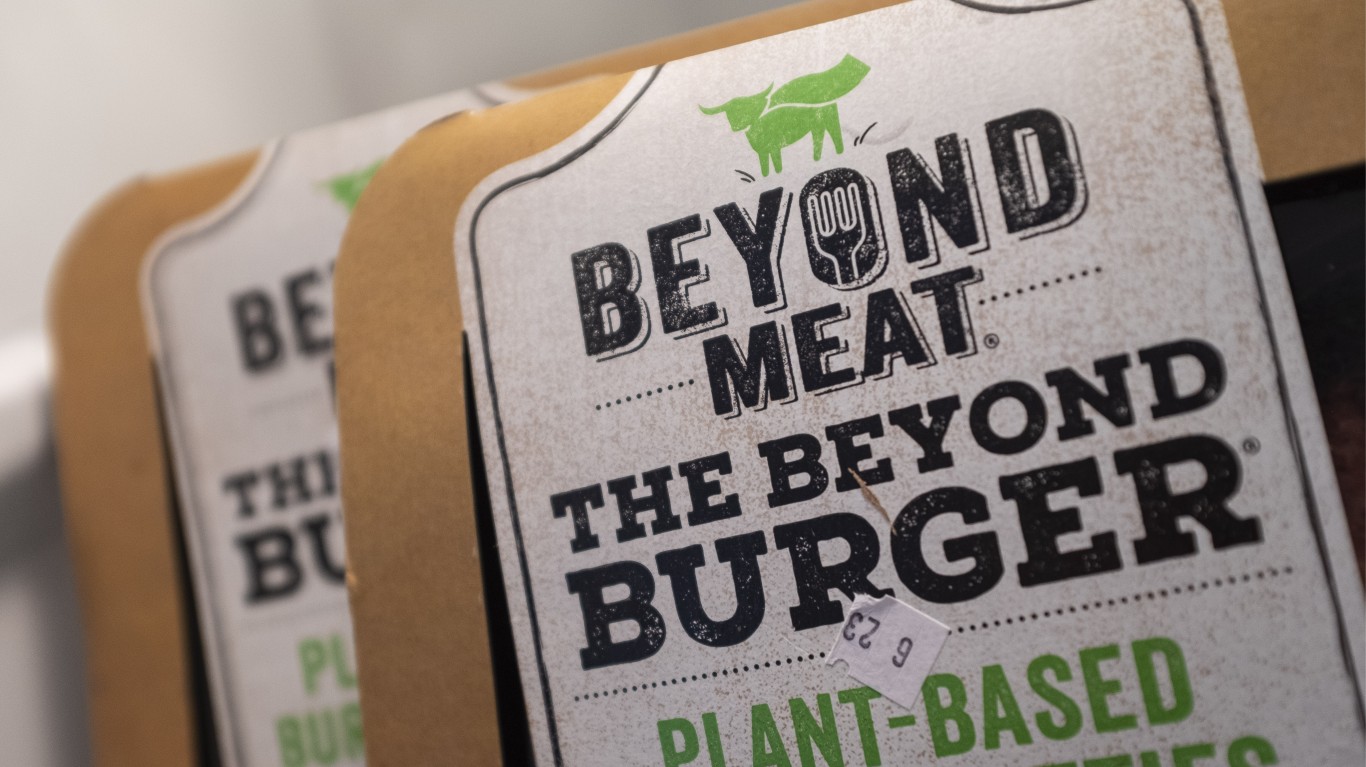
Could the coronavirus pandemic lead some Americans to stop eating meat, or to reduce their consumption? Some environmental and animal rights advocates think so.
It’s not just meat shortages that could cause consumers to switch to plant-based meats. Some advocates argue massive outbreaks of COVID-19 at meat-processing facilities have shed light on a system that mistreats poor workers and pollutes the environment.
If you believe any of this (and some people don’t), it bodes well for Beyond Meat Inc. (NASDAQ: BYND) and competitors.
When Hamburgers Become Political
Writer Jonathan Safran Foer recently proposed a connection between the coronavirus pandemic and America’s meat habits in a New York Times Op-Ed. “An astonishing six out of 10 counties that the White House itself identified as coronavirus hot spots are home to the very slaughterhouses the president ordered open,” he wrote.
On April 28, President Trump issued an executive order classifying meat plants as “essential infrastructure” and compelling the supply chain to stay open. The order prevents local health departments from closing facilities hit hard by COVID-19.
Foer’s column argued: “If you care about the working poor, about racial justice, and about climate change, you have to stop eating animals.”
Dozens of meat-processing plants around the U.S. closed due to virus outbreaks. Nearly 900 workers at a Tyson Foods Inc. (NYSE: TSN) pork plant in Louisiana and over 850 workers at a Smithfield Foods Inc. pork facility in South Dakota tested positive for coronavirus.
The Washington Post reported this week that Tyson workers infected with COVID-19 increased from 1,600 to 7,000 in one month. Meatpoultry.com has been tracking all the closures and reopenings with a map.
Nationwide, over 4,900 workers at meat and poultry processing facilities have been diagnosed with the coronavirus, including 20 who died, according to the Associated Press. “The illnesses occurred among 130,000 workers at 115 facilities in 19 states, according to the CDC. Some states didn’t provide data, so the actual count is believed to be higher.”
The debate isn’t just for academic elites. It’s entered the 2020 presidential campaign. Presumptive Democratic nominee Joe Biden said recently: “No worker’s life is worth my getting a cheaper hamburger. No worker’s life is worth that.”
Biden isn’t advocating vegetarianism, but rather putting worker safety ahead of meat supply and cost concerns. The argument is that cheap meat produced by factory farms comes with a cost to worker welfare and the environment.
“The slaughterhouse employees currently being put at risk to satisfy our taste for meat are overwhelmingly brown and black,” Foer noted. “Suggesting that a cheaper, healthier, less exploitative way of farming is elitist is in fact a piece of industry propaganda.”
Industry Growth
Even if you don’t subscribe to this political point of view, you can’t deny that the meat substitutes industry is growing. More Americans consider themselves to be vegetarian or vegan. And an increasing number of meat eaters say they are reducing the amount of meat they consume.
Just this week, global food giants Marfrig and Archer Daniels Midland Co. (ADM) said they are expanding their plant-based food products from South America into North America. The companies announced the launch of PlantPlus Foods, a joint venture. Based in Sao Paulo, Marfrig is one of the world’s largest beef producers. Chicago-based ADM (NYSE: ADM) is a global food and commodities company.
In fact, most of the major food conglomerates have some sort of plant-based meat play. Some are pushing meat/non-meat hybrids.
The Raised and Rooted brand from Tyson Foods includes hamburger patties made from a blend of beef and pea protein. The pitch is that blended burgers have fewer calories and less fat. Named a top food trend of 2020 by Amazon’s Whole Foods, “blended burgers” might also appeal to eco-conscious meat eaters who are looking to reduce their meat consumption.
Raised and Rooted also now sells plant-based faux chicken nuggets. Last year, Tyson said the brand is available in 7,000 stores.
Other meat alternatives competing for shelf space include Smithfield’s Pure Farmland, Hormel’s Happy Little Plants, and Maple Leaf Food’s Lightlife. Some of these brands were only launched last year.
Beyond Meat’s Appeal
For investors looking for a pure plant-based meat investment, Beyond Meat is the only game in town. Its biggest rival, Impossible Foods, is privately held.
That pure-play status, plus the Beyond Burger’s reputation as a premium product, explain why the stock has been a hot, if volatile, stock. The stock is way off its 52-week high of $239.71, but is up 65.24% year to date. Beyond Meat was trading at around $125 Thursday morning.
The stock gets mixed reviews from analysts, with an average price target of $93.94, suggesting a potential downside. Beyond Meat has five Buy ratings, eight Hold and seven Sell.
Earlier this month, BTIG initiated coverage of the stock with a Buy rating and a bullish target of $173.
It’s Your Money, Your Future—Own It (sponsor)
Are you ahead, or behind on retirement? For families with more than $500,000 saved for retirement, finding a financial advisor who puts your interest first can be the difference, and today it’s easier than ever. SmartAsset’s free tool matches you with up to three fiduciary financial advisors who serve your area in minutes. Each advisor has been carefully vetted and must act in your best interests. Start your search now.
If you’ve saved and built a substantial nest egg for you and your family, don’t delay; get started right here and help your retirement dreams become a retirement reality.
Thank you for reading! Have some feedback for us?
Contact the 24/7 Wall St. editorial team.


